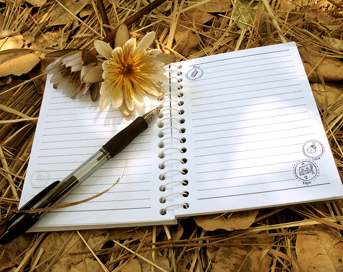Welcome to the first in my new series ‘Writing to Help Yourself,’ a series I am writing and recording for other writers who want to use the power of writing to help them work through life-changing events.
If you prefer to listen or watch, this blog post is also available in video format on my YouTube channel. Be sure to subscribe as there’s much more besides this video for writers to be inspired by!
I plan to release a video and blog post once a month in this series (alongside my regular ‘Writerly Witterings’ and ‘Readerly Ramblings’ releases.)
The issues that will be addressed will be something I have had personal experience of, and have used writing help deal with it.
If you have suggestions of any topic you would like me to cover please either drop me a line or post into the comments below.
There is no doubt of the therapeutic and cathartic properties that writing can offer us, and I often say that we are incredibly lucky as writers to have this outlet available to us.

As well as the benefits we receive, there is the added benefit of our writing being able to help and support other people, should we choose to share it.
We can write about our experiences using lots of different methods, for example, diary, letter, poem, list, personal anecdote, etc. This series will consider lots of different approaches.
This first instalment is going to deal with the issue of ‘Empty Nest Syndrome,’ the pain we can feel when our children leave home. I went through this ten years ago, when my eldest son left home, and it took some time to feel ‘normal’ again.
These weren’t entirely normal circumstances though and, if you’re interested, you can read the story behind our situation in my memoir, ‘Don’t Call Me Mum.’
My youngest son is now coming up to nineteen, therefore it’s inevitable that his decision to leave home could come in the foreseeable future, though secretly I hope it’s at least a couple of years away.
I can only speak as a mother here, but am aware that fathers will feel similarly. After so many years, parenthood becomes tied up within our identity and can bring feelings of void, age and lack of purpose to name but a few responses, especially when the youngest child leaves.

These heightened emotions will hopefully be fleeting but I recall feeling them so strongly that I needed my writing to help me get through them. Here’s a poem I have written that all parents facing ‘empty nest syndrome’ might be able to identify with:
Rewinding Childhood …
I will scatter your clothes across the floor again,
litter the bedroom carpet with cups and plates and
refill your bin to overflowing,
before shouting ‘turn it down’
as I wander past the closed door
which you’ll have slammed after your tantrum –
raging hormones and raised voices,
contrasted with excitement at your first computer and Facebook account
and a trip to town with friends,
‘as long as you’re sensible, get on the right bus.’
Your mood will be suddenly sullen, and you’ll roll your eyes.
Dropped off around the corner, you’ll pretend not to know me
as you sidle into your first disco, stinking of Linx and hair gel.
You will permit me one picture in your new high school uniform
into which you’ve yet to grow.
I will wrestle with tears through your
primary school leaver’s assembly and even as
the year six residential coach becomes smaller,
I won’t cry. I’m under instruction.
But you will when you learn Father Christmas is me,
and the tooth fairy; £2.00 will become £1.00, then 50p.
I’ll cheer your sports days, school plays and push you on the swing.
Teach you to ride a bike, fly a kite and try at everything.
I will be your left, right, up, down and sideways,
run away from reception class when you wail,
tuck you inside my coat to keep you dry.
I will answer every time you ask me why.
I will never wish away the tiresome threes,
the terrible twos and the sleepless nights.
I will show you how to walk, laugh, use a knife and fork,
how to sit up, roll and crawl and talk.
Then I will hold your new born form against me,
breathing in your scent and warmth
knowing how quickly your childhood will pass.
I am now going to offer some writing prompts that you can use to either anticipate the life event of your children leaving home, or you can use them to deal with it as it happens, or to look back at it, perhaps addressing some unresolved feelings.
- Just as I’ve exemplified above, you could make a list of your young person’s ‘milestones’ through life so far and then, using your list, write an ‘inverted’ (telling the story backwards) poem or piece of prose.
- Write a letter to your young person, thanking them for the years you’ve spent together, referring to specific experiences. Of course, you do not have to show it to them.
- Make a ‘living bucket list’ (for yourself) of all the things you could doover the next year now that you have more freedom available. (for example, a holiday or learning something new.) Bring one of these items to life by visualising it happening, then writing it out, as a scene, in present tense, as though it is actually happening.

- Write a diary entry of your happiest memory with your young person as though it’s the end of the day when it happened.
Thank you for joining me this month. Feel free to post your thoughts into the comments of how you’ve found the writing prompts. Next month’s theme will focus on dealing with the loss of a pet.
With best wishes, Maria Frankland
Disclaimer: I am not a therapist therefore if this blog post, or the subsequent activities bring up any difficulties for you where you feel you would benefit from speaking to someone, you can follow this link to access help and support.
Click here for an article which may also provide some advice for you.
If you wish, you can support the work I offer to other writers on Patreon.com.
You will then be included in my live monthly Q&A to help other writers and you will also receive a free book I have written of your choice after six months of ‘membership.’
I am also in the process of adding ten 'helpsheets' to my Patreon page - 'The Foundations of Writing.'
2 thoughts on “Writing to Help Yourself Part 1 – Empty Nest Syndrome”
Comments are closed.